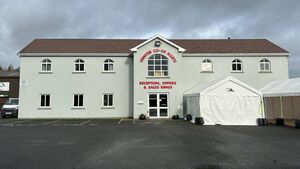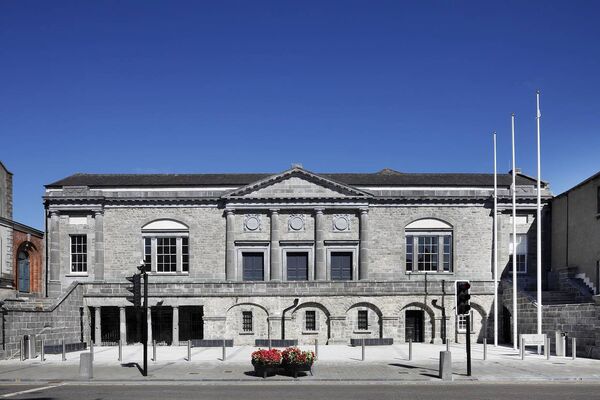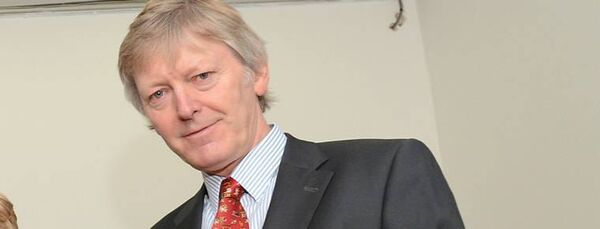Farmer gets suspended sentence for ‘poisonous attitude’ to Leinster Marts

Carlow Mart Photo: Michael O'Rourke
A BORRIS farmer was given a six-month suspended prison sentence last week for what was described as his “poisonous attitude” to Leinster Co-Operative Mart and his “malicious intent” towards one of its board members.
Seamus Hayes (61), Kilcoltrim, Borris appeared before Judge James McCourt at Kilkenny Circuit Court last Wednesday charged with harassment against James Doyle on dates between 10 August 2017 and 28 May 2021.
The circuit court was told that the case had been heard in the district court on 22 February last, where Mr Hayes was convicted on the harassment charge – which involved persistent phone calls, voicemail messages and approaches to Mr Doyle – and sentenced to seven months’ imprisonment. Mr Hayes appealed that decision to the higher court, where he again pleaded not guilty to the charge. Last Wednesday’s appeal therefore involved a full rehearing of the case and ran for almost four hours.

Directed by Kilkenny state solicitor Gerry Meaney, James Doyle told the court that he is secretary of Borris Mart and a member of the board of Leinster Marts, which operates three livestock sales – Carlow, Kilcullen and Borris. Mr Doyle is also treasurer of Ballymurphy graveyard committee and has land near Mr Hayes’s home in Borris.
Mr Doyle stated that in 2015 a local committee began the process of purchasing land to extend Ballymurphy graveyard and that, as part of this fundraising effort to buy the land, tickets were sold for a draw within the community.
Mr Doyle stated that he went to Mr Hayes’s home to sell him a ticket, but Mr Hayes had “offered his opinions rather than buy a ticket. He had his own ideas on what should be done, what the committee was doing wrong … he said things like the land was too dear, where it was located was wrong and he asked what we were going to do about it,” recalled Mr Doyle.
Mr Doyle stated that negotiations around the purchase of the land and the extension of the graveyard continued longer than first anticipated.

Then in August 2017 while he was working in Borris Mart, Mr Hayes came into the mart office and “started on about the graveyard, what was being done and where it was going”.
“I told him that he had nothing to do with it – he didn’t even buy a ticket for the draw,” recalled Mr Doyle.
He said Mr Hayes continued his questioning, until one of the mart’s staff who was present in the office intervened, saying “this isn’t the place for this”.
Mr Doyle told the court that Mr Hayes subsequently reported the exchange to Jimmy Walsh, mart manager. “He complained about the way he was treated,” Mr Doyle told the court.
Mr Doyle said it was then that Mr Hayes started “writing letters, ringing and texting” him. “The first letter to me was about the graveyard and the way he was treated in the mart. It was hand-delivered to me in my yard,” said Mr Doyle.
At this point, Mr Hayes also began questioning governance issues at Leinster Mart Co-Operative.
Mr Doyle stated that in September/October 2017, Mr Hayes wrote to the secretary of the graveyard committee on the issue and the phone calls “started straightaway after that, two or three times a week, and voicemails”.
Mr Doyle said that both men live “three or four miles from each other”, adding that anytime he met Mr Hayes on the road, he would start contacting him again.
“It went on for years; it could be two or three times a week and then it would stop for a while and then start again,” said Mr Doyle.
Mr Doyle stated that Mr Hayes’s grievances with Leinster Marts resulted in him acquiring the names and addresses of each member of the board and writing to them, repeatedly ringing and writing to some members, while also requesting a copy of the co-operative’s shareholders register.
The court heard that Mr Hayes was not a shareholder of Leinster Marts.
Mr Doyle said the mart’s board had GDPR concerns about releasing the register, given the details about shareholders contained within it. “We were afraid we’d get hassle from locals and be blamed for it, if it fell into the wrong hands,” said Mr Doyle.
Continuing his evidence, Mr Doyle said he got “fed up of him ringing me all the time” and in June 2020 spoke to Garda Peter Shortall about it.
“He said he’d have a chat with him and ask him to stop and Mr Hayes said he’d do that, but it just made it worse,” said Mr Doyle.
“In June 2020, when I spoke to Garda Shortall, I didn’t want to make a statement. I was satisfied to leave it so, if he stopped,” said Mr Doyle.
However, the court heard the continual contact did not stop.
Mr Doyle said Mr Hayes would approach him at the mart in both Borris and Carlow and also “hassle shareholders” while at the mart. He also approached Mr Doyle at the farmers’ market in Borris. “He’d come in and abuse me at that as well,” said Mr Doyle.
Mr Doyle said that he would “try to avoid him at all costs” and recalled an incident in December 2020 where Mr Hayes left him three voicemails in quick succession.
The court heard that the board of Leinster Marts ultimately took the decision to bar Mr Hayes from the mart following a number of incidents.
On 28 May 2021, Mr Doyle made a formal statement to gardaí accusing Mr Hayes of harassment.
“You’re constantly looking over your shoulder, anxious about where you go or what you do … constantly on edge,” Mr Doyle told the court.
In cross-examination, barrister Richard Downey put it to Mr Doyle that Mr Hayes had legitimate concerns about the graveyard committee, including its approach to elderly people to purchase tickets and also the “lack of transparency and how things were progressing”.
“Every house was called to, you can’t leave anyone out,” replied Mr Doyle. He added that purchasing the graveyard extension had taken time, but “they got over the hump and everything was resolved”.
Mr Downey put it to Mr Doyle that Mr Hayes also had serious concerns about Borris Mart, the infrequency of the sales there and governance issues at Leinster Marts.
Mr Downey stated that in accordance with the Industrial and Provident Societies Act 1893, as amended by the Friendly Societies and Industrial and Provident Societies (Miscellaneous Provisions) Act, 2014, a co-operative must provide a register of members. “He looked for the register of mart shareholders in 2017, in 2018, in 2019 and in 2020 and he hasn’t seen it since,” said Mr Downey.
He added that Mr Hayes had been “shut out and barred from the mart, all because he asked you to discharge your statutory duties”.
Mr Doyle stated that in July 2020, Mr Hayes had been offered the opportunity to see the register under supervision at Carlow mart offices but had declined to do so.
Mr Downey also questioned Mr Doyle about a text message he sent to two of Mr Hayes’s sons and his daughter in November 2021.
“I thought they might get around him to stop, but they didn’t get around him either and he carried on harassing me,” said Mr Doyle.
“Come hell or high water, Mr Hayes was not getting that information,” responded Mr Downey.
“How many times did I have to tell the man to stop ringing me or texting me and to leave me alone?” replied Mr Doyle.
Mr Downey stated that Mr Hayes denied the level of harassment Mr Doyle complained of, adding that there was no evidence of harassment or the frequency of phone calls.
“You were aggrieved at Mr Hayes approaching you about genuine concerns he had, but he was shut out at every juncture,” said Mr Downey.
Evidence was also given of Mr Hayes’s approaches, phone calls and letters to Leinster Marts secretary Michael Kelly, board members, farm organisations IFA and ICMSA, Irish Co-Operative Organisation Society (ICOS), government ministers and local politicians, expressing his concerns in relation to governance at Leinster Marts.
Witness Jimmy Walsh, mart manager, outlined his involvement in the case, beginning with a phone call from Seamus Hayes in 2017 “asking me about James and his role in the mart and the handling of the sales”. In this phone call, Mr Hayes also expressed his concerns about the way James had treated him the previous day.
“I explained to him that James was part of our board and a volunteer worker. He asked me if there was anything I could do, and for the sake of peace I agreed to do that,” said Mr Walsh.
Mr Walsh stated that when he spoke to James, however, Mr Doyle made it clear he didn’t want anything to do with Mr Hayes.
Mr Walsh then went through his dealings with Mr Hayes over the subsequent years, including Mr Hayes’s letters, phone calls and approaches to board members, including their wives and family members. Mr Walsh said that in order to resolve matters, he invited Mr Hayes to the AGM of Leinster Marts – even though he was not a shareholder – and Mr Hayes did attend and asked questions.
“When Covid came, then it took on a new life,” Mr Walsh told the court, adding that ultimately Mr Hayes’s “behaviour to our staff, both myself and board members, was something we couldn’t put up with”.
“His behaviour was not acceptable and I wrote to him,” said Mr Walsh.
Mr Walsh reflected that he was “unknowingly led into something in my attempts to be civil. I didn’t realise what I was being led into”.
Mr Walsh stated that Mr Hayes began contacting Leinster Marts secretary Michael Kelly, including contacting Mr Kelly’s wife.
In March 2021, Mr Hayes was banned from the mart.
“The mart is a very tolerant place, so to be banned out of it, you’ve really, really upset people,” said Mr Walsh.
In cross-examination by Mr Downey, Mr Walsh was questioned intensely on the drop in the number of sales held at Borris Mart and suggestions that the mart was “falling into dilapidation”.
Mr Walsh accepted there had been a decline in the number of sheep sales, but this reflected a general decline in sheep stocks nationally. He stated that Borris Mart had undergone a refurbishment last year, while inspections were carried out annually by the Department of Agriculture, which Borris Mart consistently passed.
In relation to the accessing of the shareholders register, Mr Walsh stated that Leinster Marts had sought advice from the data commission, but “did not receive a clear answer on it”.
He added that “at least twice, Mr Hayes had been offered the opportunity to review the register but had refused”.
Mr Walsh recalled a number of incidents where mart staff were “accosted” by Mr Hayes, often in front of customers and other people, including an incident where he told a member of staff she was “too old to be there and should be gone years ago”.
He had also alleged Mr Doyle was “getting cash and was being paid under the table”.
Gda Shortall gave evidence of initially speaking to Mr Doyle on 19 June 2020 and then going to the home of Mr Hayes to “advise him strongly to stop calling Mr Doyle”.
“I said to him that if he is consistently ringing and messaging members of the mart, it could be deemed as harassment,” said Garda Shortall.
Garda Shortall gave evidence of Mr Doyle ultimately making a formal statement in May 2021 and submitted into evidence four voicemail recordings made on the same day by Mr Hayes to Mr Doyle.
Garda Shortall also took a statement from Thomas Lawlor in May 2021.
He stated that Mr Hayes was arrested at his home on 5 November 2021 and detained at the garda station, where he gave a detailed statement taken over two-and-a-half hours. In his statement, Mr Hayes described his phone calls to Mr Doyle as ‘few and far between’ and refuted suggestions that they were excessive. Mr Hayes also offered gardaí access to his phone records.
Garda Shortall stated that Mr Hayes’s phone was a “JCB phone and not a smart phone”, while on the injured party’s phone, the information required could not be downloaded.
In evidence, Mr Hayes stated that he had “no issue with James Doyle in relation to the graveyard”, adding that there had been a lot of misinformation in the community and that he simply had queries.
He described his exchange in Borris Mart with Mr Doyle as “low key”, but added: “James was anything but cordial.” “I was disappointed with his demeanour and got no clarification. That encounter in the sheep mart in Borris impinged against my character,” Mr Hayes told the court, referring to a comment he alleged Mr Doyle made to him – “we all know the way you behave in public”.
In relation to his requests to see the Leinster Marts shareholders register, Mr Hayes replied: “Yes, I was tenacious, I was dogged, I was determined and it seems that caused Mr Doyle a lot of anxiety and upset and that was not my intention.” He added his belief that the mart’s board had a “duty to exercise due diligence by law” and this was not being adhered to. He was also critical of the management of Borris Mart and what he saw as its decline over the years.
Mr Hayes objected to the “conditional” offer to view the register and stood by his belief that Michael Kelly as secretary had to present the register.
“These guys (Leinster Marts) are still blackening me; I had to play the rules by their game. It became clear to me that this organisation, come hell or high water, were going to pull the black veil around it, demonise me and paint me in a bad light,” Mr Hayes told the court.
In cross-examination, Mr Meaney suggested that Mr Hayes “had malicious intent on Mr Doyle and then turned on the mart when you didn’t get your way”.
Mr Meaney added that Mr Doyle had shown “remarkable restraint given the hardship he was getting off you (Mr Hayes) for five years”.
He stated that Mr Hayes had a “poisonous attitude” to the mart, which Mr Hayes refuted.
Following closing remarks, Judge McCourt stated that he was satisfied with the conviction of the district court, adding that he had “no doubt at all” as he considered the evidence.
“The evidence of Garda Shortall, Mr Doyle and Mr Walsh was straightforward and reasoned. Mr Hayes’s demeanour throughout was confrontational,” said the judge.
“While I am convinced of his guilt, I don’t agree with the sanctions imposed,” said the judge, adding that Mr Hayes had become “consumed with the issue” in what essentially “boils down to a neighbours’ dispute”.
The judge stated that Leinster Marts’ error in not making the shareholders register available had been made due to “caution”, but this had not in any way justified Mr Hayes’s actions.
He sentenced Mr Hayes to six months’ imprisonment, suspended on condition that Mr Hayes refrain from any interaction with Mr Doyle, Mr Lawlor or Mr Walsh, unless requested, or engage with anyone from Leinster Marts “unless invited to do so”.
He was also to enter into a bond of €2,000, to be of good behaviour and keep the peace for 12 months and refrain from any contact, written, verbal, social media or by any intermediary, with any of the witnesses or Leinster Marts.
It was clarified that Mr Hayes’s sons, who were present in court, could attend the mart.




